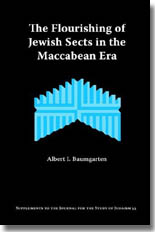
$32.00
This volume asks why Jewish groups—Sadducees, Pharisees, Essenes, and the Dead Sea Scroll sect—flourished during the Maccabean era. It argues that such a result is uncommon, requiring special explanation. In the introduction, sectarianism is defined and its varieties in Second Temple Judaism assessed. Among the causes of the known results suggested are the encounter with an outside culture that seemed to be weakening the external national perimeter, the impact of expanded literacy, the move to the city from the farm, as well as eschatological hope aroused by Maccabean victory. In proposing these conclusions, full advantage is taken of recently published Qumran sources, such as 4QMMT. The objective is to discover the connection between context and consequence, which will explain why sectarianism was so prominent at that time.
Albert I. Baumgarten, Ph.D. (1972) in History, Columbia University, is Associate Professor of Jewish History at Bar Ilan University, Ramat Gan, Israel. He has published numerous studies applying social-scientific methods to the understanding of Second Temple Judaism.
“Baumgarten’s book is a breath of fresh air. He takes the broadest possible view of the limited evidence for early Jewish sects, generating multiple possible interpretations—a fertile, thoughtful, and suggestive treatment.”
—Anthony J. Saldarini, Journal of Religion
“The depth and vigor of this enquiry are so impressive that many of his multifarious observations may well become standard. The book has interesting ideas of widely varying kinds on almost every page.This is an important book to which both students and scholars will turn for stimulation and enlightenment.”—Martin Goodman, <ahref=http://bookreviews.org/bookdetail.asp?TitleId=2784&CodePage=2784>Review of Biblical Literature
